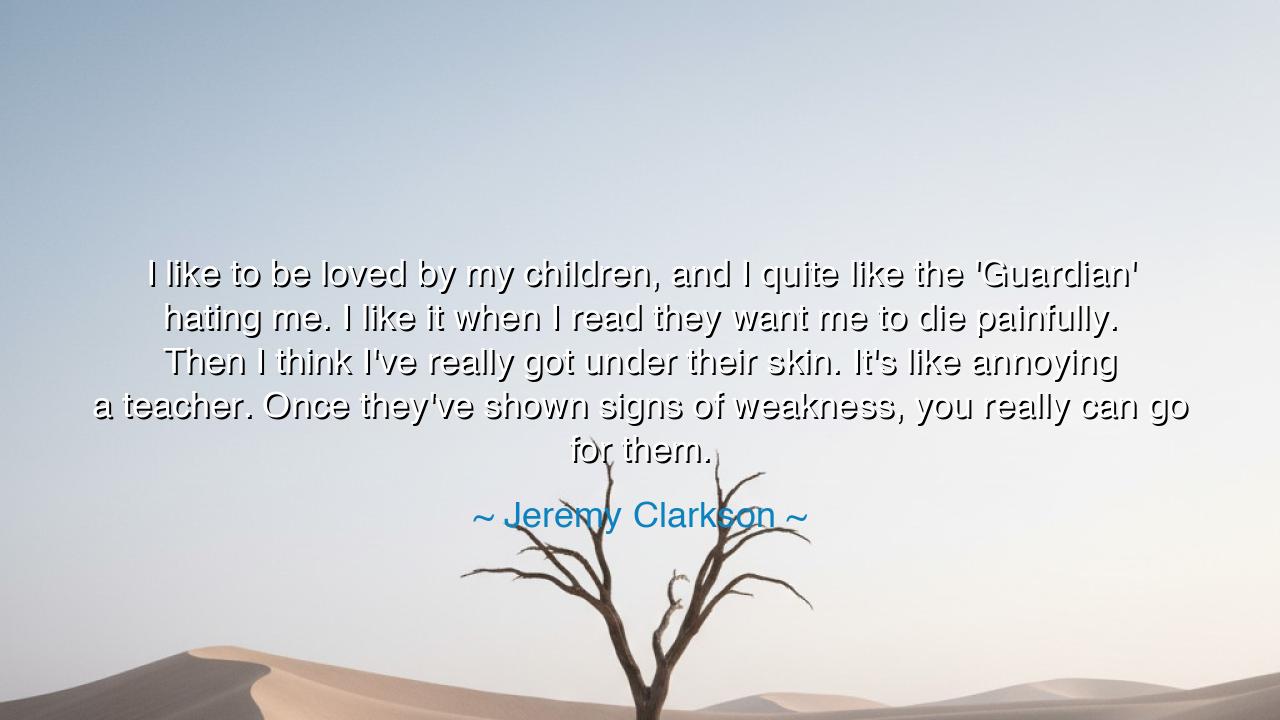
I like to be loved by my children, and I quite like the
I like to be loved by my children, and I quite like the 'Guardian' hating me. I like it when I read they want me to die painfully. Then I think I've really got under their skin. It's like annoying a teacher. Once they've shown signs of weakness, you really can go for them.






Hear the voice of Jeremy Clarkson, who with jest yet also with truth declares: “I like to be loved by my children, and I quite like the Guardian hating me. I like it when I read they want me to die painfully. Then I think I’ve really got under their skin. It’s like annoying a teacher. Once they’ve shown signs of weakness, you really can go for them.” In these words lies not only the humor of provocation but the ancient wisdom of how conflict reveals the power of influence. For he speaks of the joy in being loved by those closest to him, while taking equal delight in stirring the anger of those who oppose him — for to move others so deeply, whether to affection or rage, is proof of presence, proof of power.
The origin of this thought rests in the life of Clarkson as a provocateur, a voice often unafraid of mockery or controversy. But beyond the man himself, his words echo the timeless principle that to provoke reaction is to reveal strength. He likens it to annoying a teacher — that childhood act of rebellion, where the true triumph is not in the words spoken but in seeing authority lose composure. For when the mighty grow angry, when critics resort to curses, they confess unconsciously that they have been struck in a place of vulnerability. Thus, Clarkson delights not in cruelty, but in the proof that he has unsettled the complacent.
This is a truth recognized throughout history. Consider the tale of Socrates, who so irritated the Athenians with his questions that they condemned him to death. His constant probing of their beliefs pricked their pride, and their fury became his greatest triumph, for it revealed that their confidence was not as solid as they claimed. Though they silenced his body, his words lived on, piercing generations to come. In the same way, Clarkson points out that when enemies resort to hate, they confirm the force of his presence, for hatred is but the shadow cast by influence.
The quote also reveals a balance between love and hate, between the intimacy of family and the hostility of critics. Clarkson delights in being loved by his children, for that is the sanctuary of affection where the heart finds its anchor. But he also welcomes the hatred of opponents, for in that hatred he sees the echo of his voice. Thus he embraces both — the warmth of love and the sting of enmity — as signs that he has lived fully, striking chords strong enough to be felt. The true danger, he implies, is not to be hated but to be ignored, for indifference is the mark of insignificance.
Yet his words also speak of weakness, of how showing offense is itself a confession. When a teacher, once calm and commanding, grows visibly annoyed, the students know they have power. Likewise, when critics resort to venom, the one criticized may smile, for their rage is proof that their composure has been broken. It is not malice but strategy: by observing the cracks in another’s armor, one learns where their humanity lies. Thus Clarkson teaches, in jest and in wisdom, that the anger of one’s critics can be nourishment, proof that one has indeed "got under their skin."
The lesson for us is clear: do not fear criticism, nor shrink from the hatred of others, if it arises from truth spoken or conviction held. For in such reactions lies proof that you have touched something real, something powerful enough to stir hearts from their slumber. Seek love where it is true — in family, in friends, in those who know your heart. But do not weep over the hatred of strangers, for their fury may be the greatest compliment.
Therefore, take these practical actions: Speak boldly, even if your words provoke. Do not measure your life by the absence of enemies, but by the depth of love and the strength of reaction you inspire. When hated, do not despair — instead, ask what truth in your words struck so deeply. When loved, cherish it, for that is the foundation upon which all else rests. And above all, fear not the noise of critics; fear only the silence that comes when your words and deeds stir no one at all.
So remember Clarkson’s words: “I like to be loved by my children, and I quite like the Guardian hating me.” Love and hate, affection and fury — both are signs that one’s life has weight, that one’s presence is felt. To move others is to matter; to provoke is to awaken; to disturb is sometimes to reveal truth. Let your life be lived not in timid quiet, but in the boldness that leaves marks — whether of love in the hearts of your own, or of ire in the hearts of those who resist you. For both prove that you have lived with force, and not in vain.






AAdministratorAdministrator
Welcome, honored guests. Please leave a comment, we will respond soon